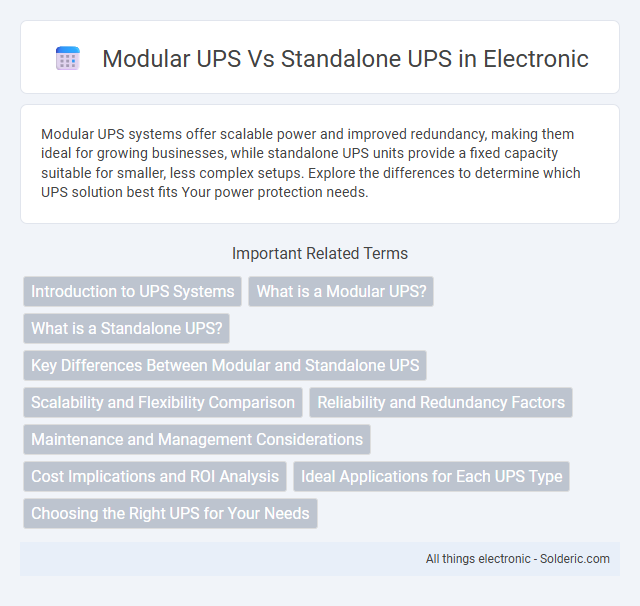Modular UPS systems offer scalable power and improved redundancy, making them ideal for growing businesses, while standalone UPS units provide a fixed capacity suitable for smaller, less complex setups. Explore the differences to determine which UPS solution best fits Your power protection needs.
Comparison Table
| Feature | Modular UPS | Standalone UPS |
|---|---|---|
| Scalability | High - add or remove power modules as needed | Limited - fixed capacity, no expansion |
| Redundancy | Built-in redundancy for continuous operation | No redundancy, single point of failure |
| Maintenance | Hot-swappable modules enable easy maintenance | Maintenance requires downtime |
| Cost Efficiency | Higher initial cost but better long-term savings | Lower upfront cost, higher operational expenses |
| Flexibility | Flexible power management and configuration | Fixed power output and settings |
| Application | Ideal for data centers, critical infrastructure | Suitable for small offices and individual devices |
Introduction to UPS Systems
UPS systems provide critical backup power to protect your devices from outages and surges. Modular UPS units offer scalable capacity through interchangeable power modules, allowing flexible growth and easier maintenance compared to Standalone UPS systems, which come as fixed-capacity, self-contained units. Your choice depends on factors like power requirements, space constraints, and budget priorities, with modular setups favored for larger, evolving infrastructures and standalone models suited for smaller, static environments.
What is a Modular UPS?
A Modular UPS consists of multiple independent power modules that work together to provide scalable and reliable uninterruptible power supply. Each module can be added or removed to adjust capacity and enhance system redundancy, ensuring continuous power protection tailored to your specific needs. This design offers easier maintenance and minimizes downtime compared to traditional standalone UPS systems.
What is a Standalone UPS?
A Standalone UPS is a single, self-contained uninterruptible power supply designed to provide backup power and surge protection for individual devices or small systems. It typically features a fixed battery capacity and power rating, making it suitable for limited load applications without the need for scalability. Standalone UPS units offer straightforward installation and are cost-effective for protecting critical equipment from power interruptions and voltage fluctuations.
Key Differences Between Modular and Standalone UPS
Modular UPS systems consist of multiple interchangeable power modules that allow for scalable capacity and redundancy, enabling easier maintenance and customization based on load requirements. Standalone UPS systems are single, self-contained units with fixed capacity, offering simplicity but limited scalability and redundancy. Modular UPS provides enhanced flexibility, higher availability, and reduced downtime compared to standalone UPS, which is more cost-effective for smaller, less critical applications.
Scalability and Flexibility Comparison
Modular UPS systems offer superior scalability by allowing easy addition or removal of power modules to match changing load requirements, ensuring optimized energy usage and reduced operational costs. Standalone UPS units provide fixed capacity with limited flexibility, often requiring complete system replacement for capacity upgrades, leading to higher expenses and downtime. The modular design enhances flexibility by supporting hot-swappable modules, enabling maintenance without power interruptions, unlike standalone UPS which typically requires shutdown during servicing.
Reliability and Redundancy Factors
Modular UPS systems offer superior reliability through scalable redundancy, enabling individual modules to operate independently and ensuring continuous power supply during maintenance or failure of a single unit. Standalone UPS units lack this flexibility, making them more vulnerable to complete power outages when component failures occur. The modular design enhances uptime and fault tolerance, critical for mission-critical applications requiring consistent, uninterrupted power.
Maintenance and Management Considerations
Modular UPS systems offer streamlined maintenance with hot-swappable modules, enabling quick repairs or upgrades without complete shutdowns, while standalone UPS units require full system power down for servicing. Your facility benefits from modular UPS management through built-in monitoring software that provides real-time diagnostics and predictive maintenance alerts, reducing downtime risks. Standalone UPS units often lack such integrated management features, necessitating manual checks and potentially increasing maintenance complexity.
Cost Implications and ROI Analysis
Modular UPS systems typically offer lower initial costs and better scalability, allowing you to add capacity as needed, which optimizes your capital expenditure and enhances long-term ROI. Standalone UPS units often involve higher upfront investment and limited flexibility, potentially leading to increased maintenance costs and less efficient energy use over time. Evaluating your power needs against the total cost of ownership reveals that modular solutions provide superior cost efficiency and quicker ROI in dynamic business environments.
Ideal Applications for Each UPS Type
Modular UPS systems are ideal for data centers, large-scale enterprise environments, and mission-critical applications that require scalability, high availability, and easy maintenance with minimal downtime. Standalone UPS units suit small to medium businesses, single-server rooms, or remote office setups where lower power capacity and simpler installation are sufficient. Modular UPS offers flexibility for growing power demands, while standalone UPS is cost-effective for fixed load requirements and straightforward backup needs.
Choosing the Right UPS for Your Needs
Modular UPS systems offer scalable power capacity and enhanced redundancy, making them ideal for growing businesses requiring flexible uptime solutions. Standalone UPS units provide fixed power capacity with simpler installation, suitable for smaller setups or single devices needing reliable backup power. Evaluating your current power demands, future scalability, and budget constraints ensures selecting the optimal UPS solution that aligns with operational continuity goals.
Modular UPS vs Standalone UPS Infographic

 solderic.com
solderic.com